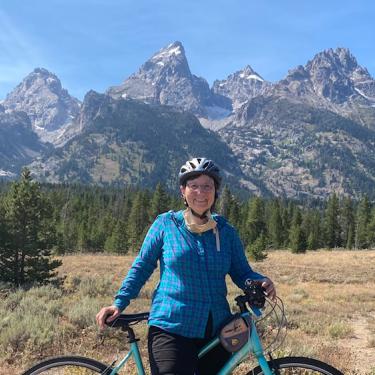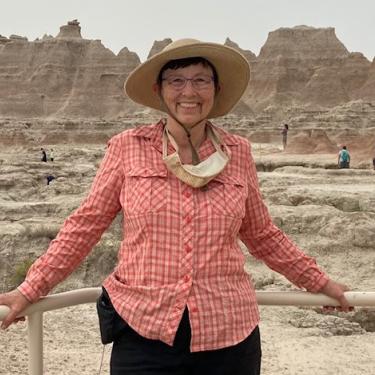
Our Woman of the Week is Jennifer McDonald, nominated for the health programs she oversees at her parish in the Pacific Northwest, which include offering blood pressure checks after liturgy and acting as the first line of defense in the parish during the COVID surges, making sure parishioners are following protocols. You see her here in the South Dakota Badlands and giving blood wearing the t-shirt of her favorite soccer team. We asked her how she became a doctor:
"When I was in fifth grade we had a student teacher one day who spoke about science and the body. I was fascinated and decided right then that I wanted to become a doctor. That held true until I was in high school and realized there would be four years of college and four years of medical school required to become a physician, which just seemed like too much school! (I didn't realize then that it would actually be at least seven years more of training after college before a physician would be ready to practice.) So, in high school, I thought about many other jobs that might be interesting--historian, nurse, Foreign Service worker. But, in the back of my mind was still the goal of 'helping people.'
"My freshman year of college I took calculus, German, political science, and music theory, which might have led me in many directions. But, at the end of the year I suddenly realized that I still wanted to be a doctor. I don't think I can explain my rationale for this except that I liked science, was curious, and wanted to help people. For the next three years, I stuffed science classes into my schedule to meet requirements to apply to medical school. I think I was very naive, because as a senior I applied to only one school--using their early decision program. I decided that if I wasn't accepted, that must mean I wasn't meant to go to medical school and should instead join the Peace Corps. (I did get in to the University of Washington.)
"Medical school was very hard work. I don't think I had any idea before starting of how the practical training (clerkships) worked. I decided I wanted to become a primary care physician--doing family medicine. I started my internship at Baylor College of Medicine in Houston, Texas. I liked the people I worked with, but did not much care for the weather. My joke at the time was that I worked up a sweat just walking to the car, so that meant I was getting good exercise. After a few months of rotations, I came to the realization that 3 months was all the general medicine I would get in that year (the other rotations being pediatrics, surgery, and obstetrics/gynecology). Each year would be the same. It didn't seem like enough time to learn all I needed to learn. My resident suggested I change to Internal Medicine, which made good sense to me. After the first year, I transferred to Portland to Oregon Health Science University, mostly because of the climate. I finished my training there, and have never moved out of the Portland metropolitan area.
"After training and passing my final tests, I worked for several years at a Veterans Administration hospital. Then, after time off for my first baby, I settled into a small practice in Vancouver, WA, where I have remained since. We did both office work and hospital rounds for many years, but that changed in about 2006, when my group was the last small group to turn our hospital patients over to hospitalists. In retrospect, that change has made it possible for me to keep working so long. I am now 70 and could never have continued to work if I still had to get up in the middle of the night and work late in the evening seeing hospital patients.
"Though I seemed to have poorly thought through the rationale for becoming a doctor, I think it was clearly the absolutely best career choice for me. It uses my interest in science, my desire to help people, my curiosity, and my analytical brain. I love history, but don't enjoy writing long essays--and back in the time I was in school, the research required paper books and careful typing! I loved singing, but wasn’t good enough to be a professional performer and don’t have a good personality for teaching. My personality probably does better not being told what to do all the time. So, a physician I am."
Axia!
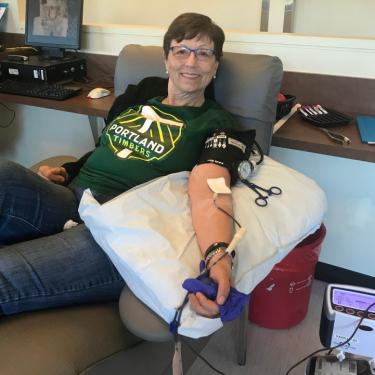
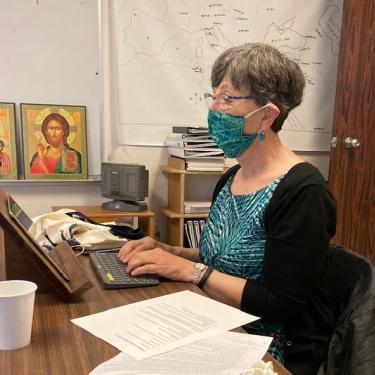
Jennifer McDonald, our Woman of the Week, was nominated for bringing her expertise as a family health physician to her work as the head of the St. Elizabeth the New-Martyr parish health committee at St. Nicholas Orthodox Church, in Portland, Oregon. You see her here taking notes at a church council meeting and singing in the parish choir. We asked her to tell us about the committee, how it began and what its aims are:
"This committee was started by our priest at the time, Fr. George Gray, in conjunction with Karen Hadley, RN. It was started as a parish nursing committee, but has expanded/morphed since its origin. We chose St. Elizabeth as our patron, because the convent she started focused on both the typical monastic activity of prayer, as well as active work to help people in the community--nursing, feeding, etc. Our service also focuses on health in body, mind, and spirit. Over the past 20 years our activities have varied based on membership, which has included: nurses, physician, speech therapist, dietician, counselor, etc. During the time of COVID we have had to limit activities severely.
"Education: We have had a number of conferences, including several programs about end-of-life planning, including medical choices, wills, funerals, and burials. Other programs have been about healthy diets and exercise, and various other health issues. We have a bulletin board with monthly rotating information about various health issues. During COVID, that bulletin board has become virtual.
"Spiritual: We provide a monthly prayer sheet including a rotation through all the parish members as well as those in need of prayer or celebrating. A prayer team prays daily for people who request prayers for themselves or others. For those who are ill, we have members who crochet or knit lap blankets while constantly praying for the individual--we call these prayer shawls, or perhaps better, would be shawls of prayers. In the past we supported monthly unction services after vespers.
"Practical: We provide or coordinate rides to church or doctors' appointments and meals for those in short-term need- such as those w/ medical issues, family deaths or births. We have a team of people who send cards to shut-ins and people with illness or loss.
"Medical: Before COVID, we had regular blood pressure screening available after church. I often speak to individuals about health concerns. During COVID, I have worked to maintain safety measures for the parish."
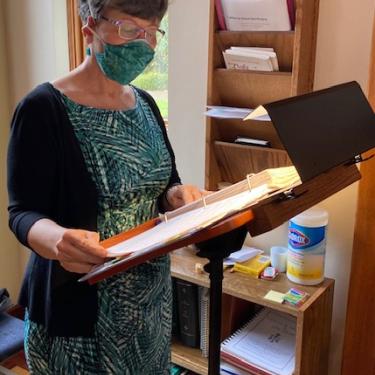
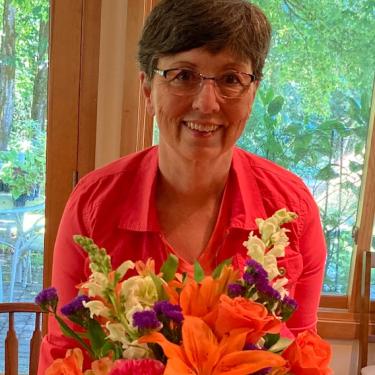
As always, we asked our Woman of the Week, Jennifer McDonald, to tell us about her morning routine. You see her here with flowers given to her for her 70th birthday, and visiting the Grand Tetons:
"My morning activities vary depending on whether I work that day, or not. My husband passed away almost 7 years ago. Before that, he would bring me the morning paper and a cup of coffee in bed. I was spoiled. Now I have to make my own coffee, but read the paper digitally. I also read the daily scripture readings on-line and Sister Vassa's daily meditation. How much paper I can finish depends on the time available before work.
"After breakfast, depending on weather and my inspiration, I travel to work via walking 1/2 mile to the bus, or riding my bike, or driving--the least inspired choice. I say the trisagion prayers and sometimes the prayer lists on my phone while traveling to work. If I am not working, I finish the paper and then go for a long walk while saying prayers and afterwards either bake bread, do charts, or work in the garden."
Thank you, Jennifer!
